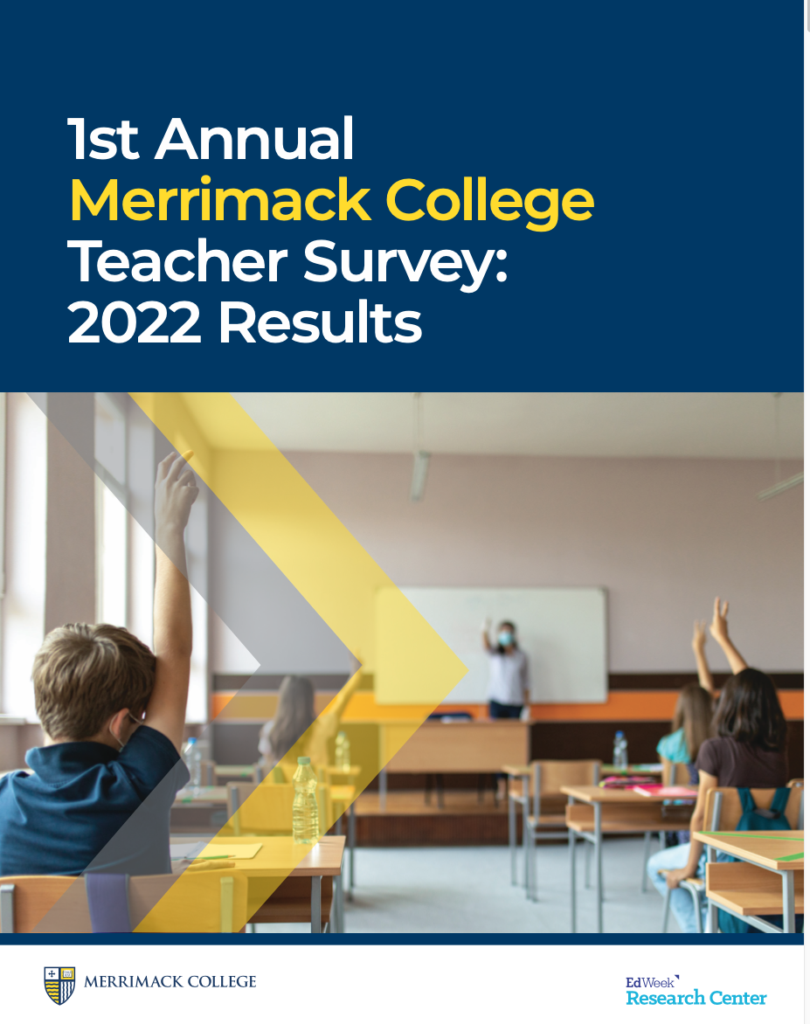 by James C. Sherlock
by James C. Sherlock
My subscription to Education Week yesterday produced a survey on teacher satisfaction that the EdWeek Research Center conducted for Boston’s Merrimack College.
The survey results suggest a deep disillusionment of many teachers who feel overworked, underpaid, and under-appreciated, with potential implications for a once-in-a-generation shift in the teaching profession. For example, just twelve percent of teachers, the survey found, are very satisfied with their jobs, with more than four in ten teachers saying they were very or fairly likely to leave the profession in the next two years.
A factor that almost certainly contributes to their rising dissatisfaction is teachers’ growing perception that the general public does not understand or appreciate their work.
Less than half of 2022 survey respondents say the general public respects them and views them as professionals, down from 77 percent of 2011 respondents to (the last) MetLife survey.
The results, while unsurprising, are worthy of exposure. The survey attributed the dismal results largely to fallout on teachers and children from the pandemic and from the culture wars in schools.
I agree. Ultimately, causes matter because they inform some long-term solutions. But we live in the immediate term.
What are we going to do to prepare for when school starts again in the late summer without enough teachers?
The results match the anecdotal evidence I have been hearing from Virginia schools in general and the schools in my home city of Virginia Beach in particular. The widespread dissatisfaction among teachers is creating a teacher supply/demand mismatch of increasing magnitude.
The pandemic shutdowns and the culture war genies cannot be put back in the bottle. The implications for the future of in-person learning in public schools are dire.
It is necessary to ask what steps the Virginia Department of Education and local school divisions are taking to prepare for teacher shortages in August. Those shortages, at a minimum, will raise the work levels of remaining teachers. And overwork is already a widespread and valid complaint.
As the survey confirmed, the effects of the pandemic shutdowns and school culture wars are the sources of teacher disillusionment and dissatisfaction with their careers.
The pandemic shutdowns that needed to last part of one semester starting in March of 2020 instead lasted throughout the 2020-21 school year in some divisions. Woke school boards, the urban press, progressives and teachers’ unions (which is a quadruple redundancy), but not nearly all of Virginia’s teachers, demanded the extension.
Catholic schools were open for in-school instruction in 2020-21 without health consequence. The learning losses among the most vulnerable student populations in public schools were life-altering. No apologies have been forthcoming.
As for the culture wars in Virginia public schools, they were declared by the woke state Board of Education appointed by Democrats. The members of that body found the pandemic period the appropriate time to pick those fights by inserting into public policy concepts that Virginians with traditional values were certain to find unacceptable.
Having thrown down the gauntlet, they got the fight they chose. That same Board of Education unintentionally elected Glenn Youngkin governor. Few protested at state Board of Education meetings. They showed up instead at their local school board meetings. And teachers felt the pain.
Where are we now? Those generational mistakes are done. We all, but especially teachers, are left to pick up the pieces.
Teachers are doing what they can for their students. The state is about to raise their salaries, a necessary step.
School teaching environments, however, are far more daunting not only because of asymmetric learning losses among the children, but because those same children’s social development was interrupted, resulting in increased disruptive behavior in schools.
The state Board of Education piled on in the past few years by reducing the autonomy of teachers in their classrooms with an enormous increase in prescriptive progressive policies. As the old saying goes, they can do anything they want as long as it is mandatory.
Much of the disruptive and destructive behavior that teachers see every day is shielded from public view by:
- reluctance to report it lest the school be singled out as poorly-led for too many incidents or considered systemically racist because of an unbalanced racial composition of miscreants;
- or, both; and
- by “restorative justice” where that policy has been implemented.
The Youngkin administration is already engaged in trying to reverse some of the worst policies, but its new Board of Education appointees will need to be in place to accomplish those objectives.
Great damage has been done.
What to do? The state has just passed a budget that will raise teacher salaries. That will help to some degree.
But I am not sure how the new administration in Richmond and local school boards are proceeding from today to deal with the projected acceleration of teacher shortages in August.
School boards will certainly be tempted to offer temporary accreditation to persons not yet qualified to be fully licensed. That is a tricky path to be trodden carefully.
With some distaste I feel obligated to point out that increased remote teaching may prove necessary in some divisions, even if the children are in their school rooms to benefit from the non-instructional advantages offered by the schools.
Experience with remote instruction has proven that many of the licensed teachers who are driven away by the in-school environments and workloads will prove amenable to just teaching and doing it online from home.
The organizations Virginia has in place, both private and public, to provide remote public school instruction may have to be expanded both in size and scope.
The private companies, led by Herndon-based Stride, have established great track records over decades in providing state-funded remote public school instruction in Virginia.
It appears that the state and local school boards will need to move quickly to expand that particular supply.

Leave a Reply
You must be logged in to post a comment.